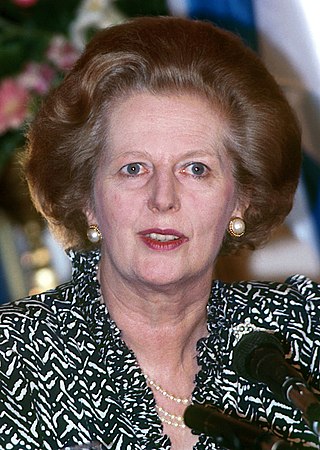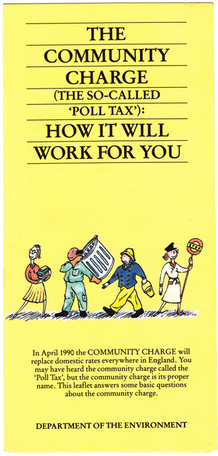
Neil Gordon Kinnock, Baron Kinnock is a British former politician who served as Leader of the Opposition and Leader of the Labour Party from 1983 to 1992. He served as a Member of Parliament (MP) from 1970 until 1995, first for Bedwellty and then for Islwyn. He was Vice-President of the European Commission from 1999 to 2004. Kinnock was considered as being on the soft left of the Labour Party.

The 1997 United Kingdom general election was held on Thursday, 1 May 1997. The governing Conservative Party led by Prime Minister John Major was defeated in a landslide by the Labour Party led by Tony Blair, achieving a 179-seat majority.

The 1992 United Kingdom general election was held on Thursday 9 April 1992, to elect 651 members to the House of Commons. The election resulted in the fourth consecutive victory for the Conservative Party since 1979 and would be the last time that the Conservatives would win an overall majority at a general election until 2015. It was also the last general election to be held on a day which did not coincide with any local elections until 2017. This election result took many by surprise, as opinion polling leading up to the election day had shown the Labour Party, under leader Neil Kinnock, consistently, if narrowly, ahead.

The 1987 United Kingdom general election was held on Thursday, 11 June 1987, to elect 650 members to the House of Commons. The election was the third consecutive general election victory for the Conservative Party, and second landslide under the leadership of Margaret Thatcher, who became the first Prime Minister since the Earl of Liverpool in 1820 to lead a party into three successive electoral victories.

New Labour was a period in the history of the British Labour Party from the mid to late 1990s until 2010 under the leadership of Tony Blair and Gordon Brown. The name dates from a conference slogan first used by the party in 1994, later seen in a draft manifesto which was published in 1996 and titled New Labour, New Life for Britain. It was presented as the brand of a newly reformed party that had altered Clause IV and endorsed market economics. The branding was extensively used while the party was in government between 1997 and 2010. New Labour was influenced by the political thinking of Anthony Crosland and the leadership of Blair and Brown as well as Peter Mandelson and Alastair Campbell's media campaigning. The political philosophy of New Labour was influenced by the party's development of Anthony Giddens' Third Way which attempted to provide a synthesis between capitalism and socialism. The party emphasised the importance of social justice, rather than equality, emphasising the need for equality of opportunity and believed in the use of markets to deliver economic efficiency and social justice.

The Community Charge, commonly known as the poll tax, was a system of taxation introduced by Margaret Thatcher's government in replacement of domestic rates in Scotland from 1989, prior to its introduction in England and Wales from 1990. It provided for a single flat-rate, per-capita tax on every adult, at a rate set by the local authority. The charge was replaced by Council Tax in 1993, two years after its abolition was announced.

Giles Heneage Radice, Baron Radice, was a British Labour politician and author. He served as a Member of Parliament (MP) from 1973 to 2001, representing part of County Durham, and then as a life peer in the House of Lords from 2001 until shortly before his death in 2022.
Essex man and Mondeo man are stereotypical figures which were popularised in 1990s Britain. The "Essex man" as a political figure is an example of a type of median voter and was used to help explain the electoral successes of Conservative Prime Minister Margaret Thatcher in the 1980s. The closely related "Mondeo man" was identified as the sort of voter the Labour Party needed to attract to win the election in 1997. Basildon man and woman are narrower terms being used synonymously.

The Young Fabians is the under age 31 section of the Fabian Society, a socialist society in the United Kingdom that is affiliated to the Labour Party. The Young Fabians operate as a membership-driven think tank that organises policy debates, research projects, publications, conferences, and international delegations. The organisation holds no collective position on policy.
Stephen Pollard is a British author and journalist. From 2008 until December 2021, he was the editor of The Jewish Chronicle and remains a senior advisor and writer on the paper.
The Mid Staffordshire constituency of the United Kingdom Parliament held a by-election on 22 March 1990. The result was the election of Labour candidate Sylvia Heal to succeed the previous Conservative Member of Parliament John Heddle, who had precipitated the by-election by committing suicide.

Stephen Nathan Kinnock is a Welsh politician who has served as Member of Parliament (MP) for Aberavon since 2015. A member of the Labour Party, he has been Shadow Minister for Immigration since 2022.

"It's The Sun Wot Won It" was the headline that appeared on the front page of United Kingdom newspaper The Sun on 11 April 1992. It is regularly cited in debates on the influence of the press over politicians and election results and has since become a British political catchphrase.

The Fabian Society is a British socialist organisation whose purpose is to advance the principles of social democracy and democratic socialism via gradualist and reformist effort in democracies, rather than by revolutionary overthrow. The Fabian Society was also historically related to radicalism, a left-wing liberal tradition.
The 1998 Wandsworth Borough Council election took place on 7 May 1998 to elect members of Wandsworth London Borough Council in London, England. The whole council was up for election and the Conservative Party stayed in overall control of the council.

Neil Kinnock was Leader of the Labour Party and Leader of the Opposition from 2 October 1983 to 18 July 1992. He convincingly defeated Roy Hattersley, Eric Heffer, and Peter Shore in the 1983 leadership election, which was prompted by Michael Foot's resignation following the disastrous general election result earlier that year. Kinnock's period as Leader encompassed the bulk of the Thatcher premiership and the first two years of the Major premiership. Kinnock resigned in 1992 after losing his second election as Leader.
"One more heave" was a slogan used by British Liberal Party leader Jeremy Thorpe during the October 1974 general election and a phrase used to describe the political strategy of John Smith, leader of the Labour Party from July 1992 until his death in May 1994.
The annual election to the Labour Party's Shadow Cabinet was conducted in 1987. In addition to the 16 members elected, the Leader, Deputy Leader, Labour Chief Whip, Labour Leader in the House of Lords, and Chairman of the Parliamentary Labour Party were automatically members.
Elections to the Labour Party's Shadow Cabinet were announced on 28 October 1983. In addition to the 15 members elected, the Leader, Deputy Leader, Labour Chief Whip, Labour Leader in the House of Lords, and Chairman of the Parliamentary Labour Party were automatically members.

John Major formed the second Major ministry following the 1992 general election after being invited by Queen Elizabeth II to begin a new administration. His government fell into minority status on 13 December 1996.













